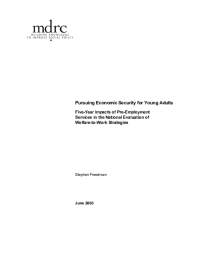Pursuing Economic Security for Young Adults
Five-Year Impacts of Pre-Employment Services in the National Evaluation of Welfare-to-Work Strategies
Drawing from administrative records and survey data collected for the National Evaluation of Welfare-to-Work Strategies (NEWWS) during the 1990s, this report extends MDRC’s research on whether mandatory employment-focused and education-focused welfare-to-work programs help people find jobs, attain stable employment, and earn more over time. Here, the focus is on single parents who were aged 20 to 24 when they entered the study. Members of this subgroup — who account for nearly 20 percent of NEWWS’s full sample — often lacked the educational qualifications and workplace skills needed to make a successful transition to employment. Based on NEWWS’s rigorous random assignment design, the report finds that both types of programs led to higher earnings by young adults over a five-year follow-up period, compared to members of a control group who were not enrolled in these programs. Among young adults who lacked a high school diploma or General Education Development (GED) certificate at study entry, education-focused programs also led to a relatively large impact on receipt of a GED. However, some education-focused programs succeeded for young adults while others did not, and there were no observed differences in program implementation that explained this variation.






